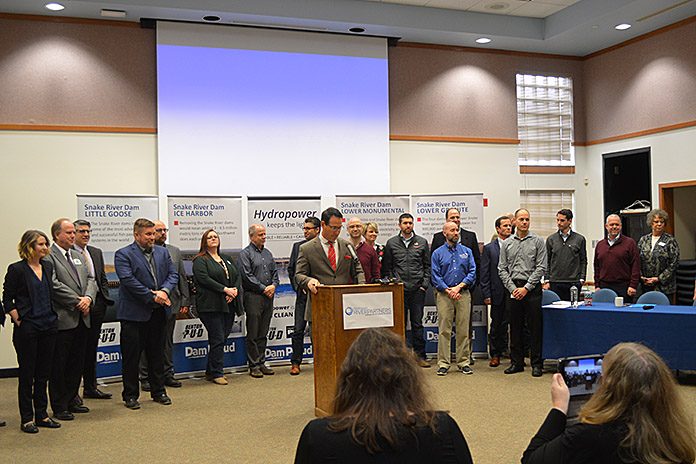
NorthwestRiver Partners and regional stakeholders expressed satisfaction today with a Draft Environmental Impact Statement (DEIS) released Friday that did not recommend the breaching of the four lower Snake River dams, but said they will remain vigilant in their efforts to protect the dams and the region that relies on them for affordable energy.
“Today’s gathering is not a victory lap,” said Mike Gonzalez of the Franklin County PUD during a press conference held in Kennewick today. “There will still be many who disagree with the report and will be very active in trying to change it.”
The 5,000-page DEIS includes a “Preferred Alternative” for Columbia River system operations, and breaching the dams is not the preferred alternative. A National Environmental Policy Act (NEPA) review was ordered by Federal District Court Judge Michael Simon in 2016 to specifically study the breaching of the four lower Snake River dams.
There is now a 45-day comment period on the DEIS. Stakeholders are worried that even if the final decision is to leave the dams standing, an order could come for a significant drawdown of water to aid fish passage – which would be viewed by stakeholders as nearly as damaging to the economy as breaching.
Kurt Miller, executive director of NorthwestRiver Partners, talked Monday about what a big jump in energy costs that would result in breaching the dams would mean to the area’s economy.
“The cost of living in the Pacific Northwest is getting increasingly expensive,” he said. “If the dams were breached, it would spike energy costs by as much as 25 percent.”
Rick Dunn, general manager of the Benton County PUD, said the region’s economy and energy needs rely on the dams. Hydro energy is reliable, unlike wind or solar that comes and goes, he said. The chance of regional blackouts would spike without the dams, as would residents’ utility bills. That, in turn, said Dunn, would hamper the region’s efforts to attract new industry.
Removing the dams would mean eliminating a key method of transportation of cargo in the area and would mean a big increase in highway traffic – as much as 100,000 more trucks per year, said Vicki Green, vice president of the Port of Pasco.
Robin Priddy of the Benton Clean Air Agency said the breaching the dams would make barge traffic impossible, translating to two million tons of extra cargo being hauled on the highways, adding to the region’s pollution levels.










